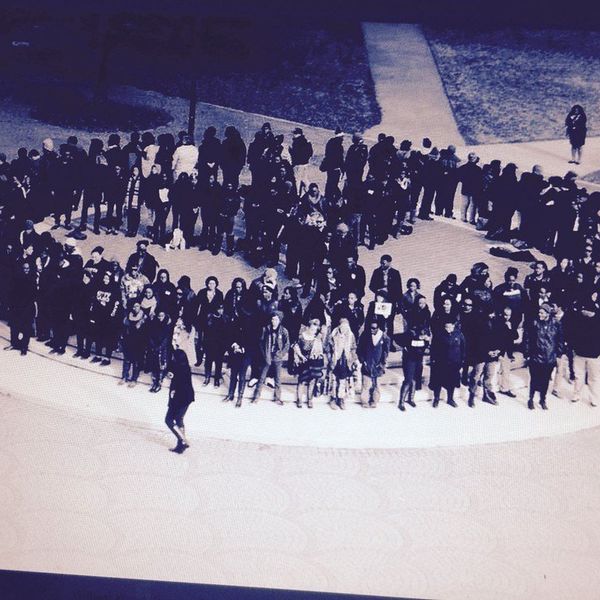As I am concluding my first (half) week in college, a word that has seamlessly been thrown around a lot is "diversity." It is typically brought about when discussing the uptick in the percentage of incoming freshman minorities in comparison to past years while also celebrating the college's new Dean of Diversity and Inclusion.
A topic in which I would like to briefly address is does simply having minorities from arbitrary backgrounds actually add to diversity and what doing this means for inclusion.
Race, culture, sex and religion are the four archetypal go-to's when it comes to generally assessing what makes one diverse. Reasonably so, for if one is from a different religion they're bound to have a different perspective on, say, religion - and the same can go for the other three go-to's as well.
Also, when having a student body that doesn't primarily compose of the general white-male, as have a grave majority in our country's past, allowance for the magical four go-to’s to is now possible - hooray for inclusion, right?!
Before I go into my opinions of the matters at hand, I want to acknowledge the need for diversity. Due to institutionalized racism and other systematic setbacks for minorities which are transparently embedded in our society and culture, a conscious effort needs to be made in order to balance the playing field - in other words, to right the wrongs of history and its hideous effect on various cultures.
The process of consciously doing this can be tricky, particularly when being implemented by those whose backgrounds can generally be said to have benefited from this country's past (and arguably current) atrocities; nevertheless, it is through these privileged minds that diversity is destined in subsequently pursued.
From an outside, unknowing perspective, this may seem like a decent plan and in some other realm it very well may have been. In reality, however, going about inclusion and adding diversity in this way has only led to illusion and over-inflation of a once meaningful word.
The once significant word of diversity, what exactly was its original definition?
Diversity is generally understood to be a set of abstract idiosyncrasies one may possess which subsequently sets them apart. With this being said, I want to first challenge the modern conception of diversity and also the plausible and arguably apparent margin of error which is often present in achieving the desired level of inclusion - making a conscious effort to encompass the four go-to's. In doing this, I will also discuss a possible reason for the occurrence of the margin of error.
Human nature is an extremely divisive, pervasive force in many instances - ingraining within us a longing for the "alike."
As an example, consider running the daily errand in a grocery store. When going throughout the store, one pumps into an adult who then releases apologetic words with a voice of stern articulation. Due to their fair complexion, articulate voice and controlled tone, they are subconsciously associated with leadership and success and henceforth likened, even by those who are said to be abide by the contemporary liberal movement of overall equality and tolerance. Later on, one runs into a gruff fellow with a distinguishable hygiene and a jumbled dialect which is difficult on the ears. From this brief interaction alone, the gruff fellow is subconsciously associated with poverty and an inescapable struggle which results in one creating distance from him and henceforth disassociating - a contrary reaction from the errand runs first encounter.
In short, the pervasiveness of implicit bias burdens even the humblest of men for it is natural and thus inevitable to be inundated and consumed by social norms.
As this relates to the contemporary goal of inclusion, implicit bias becomes a tad bit more difficult to detect as it takes on a slightly different form; but, once detected, it cannot be disclosed.
Over recent years racism, by some, is said to be slowly waning away as we enter into the age of tolerance and color-blindness while others argue that racism has simply transformed or evolved. Whichever may be true, it is inarguable that one is more likely to willingly or unwillingly associate with those who are well-off, even in when opposition of persons one may be more similar to (as qualified above).
This then brings into question what the deciding factor of [un]willing association is. The four go-to's, race, culture, sex and religion, are typically what people perceive to be the answer to this question. This perception is largely inadequate as it disregards the colossal impact in which wealth/poverty can have - this is the true and honest decisive factor. It is easy to be blind to this due to affinity bias - longing to be with those who are similar; although, in contemporary society, we generally have equal, if not greater, similarities with those who come from a similar socioeconomic background than our own rather than anyone who fall under our respective branch of the go-to's.
Nevertheless, attempting to be inclusive of those who fall into the minority section of the four go-to's may not seem like a bad idea, as they are in fact minorities; but what often goes disregarded is the propensity of the affinity bias for minorities as well - minorities may (either consciously or subconsciously) conform to the general standard of society to the best of their ability, and in the situation where they have access to a desired level of wealth they will essentially become homogeneous with the general standard in every way outside their respective go-to, while even in that they are slowly but surely conforming.
This is not a complete theory, rather the first part of a series. As a college student with a lot on a my plate, I can only do so much in one week. I look forward to expanding on this.





















